#dominicans
Explore tagged Tumblr posts
Text
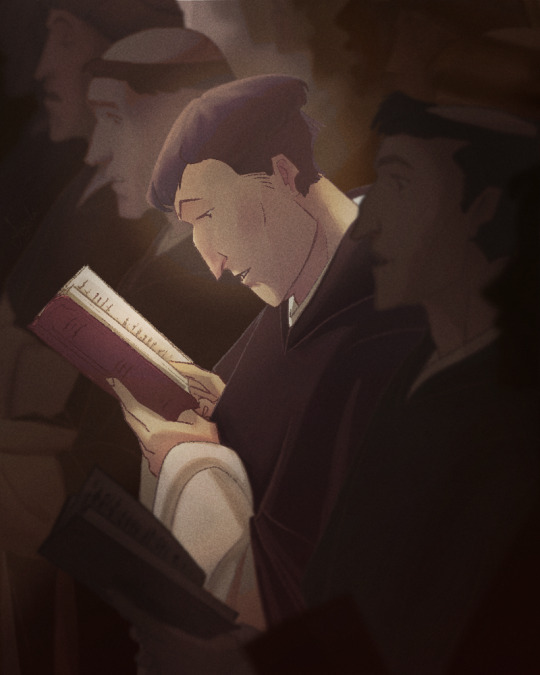
A young Thomas during vespers
Thinking of the how every saints at one point had sang, and I just thought of our dear theoligian and what his voice would've sounded like.
#Didn't expect from myself to design a younger version of Thomas but I got inspired#I now just realized I should've drawn him with a Benedictine habit#Yes a full set of hair for Thomas during his 20's#Saint Thomas Aquinas#Saints#Catholic art#my art#digital art#my faith#Christianity#St. Thomas Aquinas#Dominicans
215 notes
·
View notes
Text
This Latina woman is getting a quick lesson in, "Yes, you're light skinned, but you're not White skinned". As an Afro-Latina myself (my mother), I feel for those Latinos who did not vote for Trump, because now, because of the "minority majority" of their groups, the "good ones", the non-racist ones, have to pay for the others decisions. The sister in the video is right, stop making these #TikTok videos of y'all crying all over the place, because it giving "White woman tears" as far as I'm concerned, but "White women tears" are backed-up by this White supremist American system, and "Latino or Black tears" still gets us, shot, hunted, beaten, hosed, pepper sprayed, profiled, and marginalized. 60+ % of Latinos went against the warnings of Black people, mainly Black women, and now the day of your reckoning is upon you. I had to tell my mom to stop getting upset about what's going on, and that [They] made their bed, and now they will lie in it. This will all one day pass, and come next time when you Latinos are faced with a choice between humanity and White supremacy, let's see how well you remember this moment. Tengo un lugar en mi corazon para mi gente latino, pero ustedes deben aprender como lo hemos hecho nosotros. 🙏🏽🙏🏽🙏🏽🖤🤎💗
#black women#afro latinas#afro latinos#immigration#ice#national guard#mexicans#trump#puerto ricans#dominicans#cubans#venezuelans#haitians#african women#black beauty#black queen#black men#caribbean#south america#africa#african#black history#politics#black teachers#black inventors#black fashion#black love#black tumblr#black couples#black boys
65 notes
·
View notes
Text

This 15th-century fresco was recently restored - check out our piece here
26 notes
·
View notes
Text
42 notes
·
View notes
Text
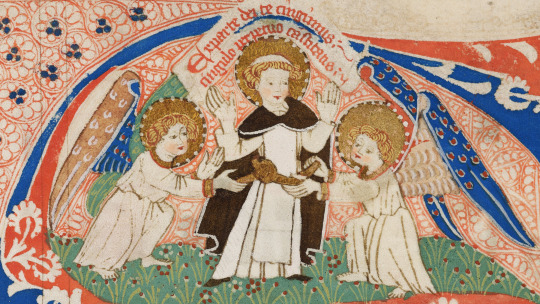
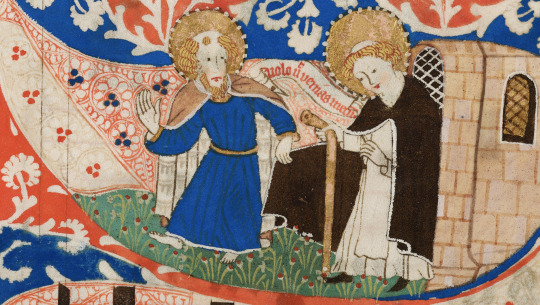

Illuminated letter S from an antiphon, with two scenes from the life of St. Thomas Aquinas
Attributed by the museum to Germany, ca. 1450, though possibly from, more specifically, Alsace or Austria. The manuscript was likely created by Dominican nuns.
Indianapolis Museum of Art at Newfields (supplementary information via Medieval Manuscripts Provenance)
#medieval#medieval art#dominicans#st. thomas aquinas#thomas aquinas#1450#illuminated manuscript#christianity#catholicism
52 notes
·
View notes
Text

Saint Catherine de Ricci
1522-1589
Feast Day: 4 February (changed in 1971 from 13 February)
Patronage: Against illness, the sick, Prato, Italy
Saint Catherine de Ricci was born to a noble Italian family. As a child, she spoke to her guardian angel, prayed the rosary, and did penances. At 14, she entered the Dominicans and became perpetual prioress at 25. Catherine was a great mystic and could bilocate. She is said to have received a ring from the Lord as a sign of her espousal to him; to her it appeared as gold set with a diamond; everyone else saw a red lozenge and a circlet around her finger. At 20, she received the stigmata and experienced the “Ecstasy of the Passion” for 12 years. Her sanctity drew many for advice and prayers, including three future popes. She died in 1589 after a long illness.
Prints, plaques & holy cards available for purchase. (website)
28 notes
·
View notes
Text
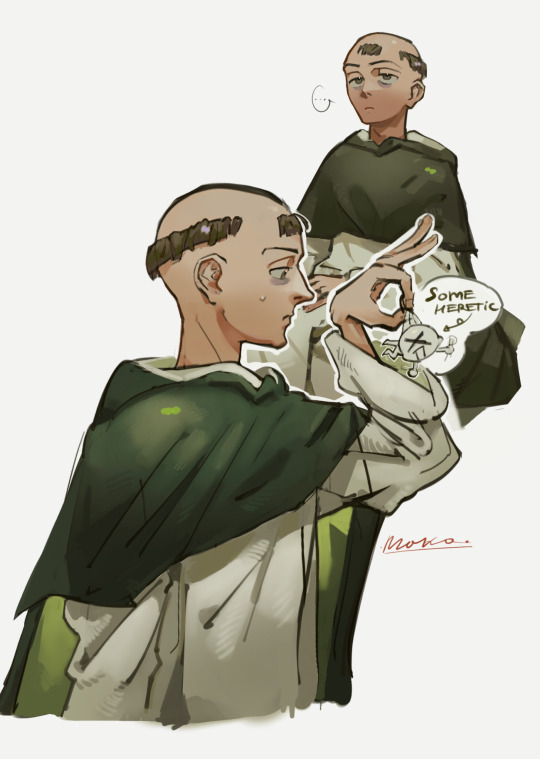
still figuring out a name for him,,
#sketch#digital art#doodle#digital sketch#oc#original character#dominicans#artists on tumblr#oc art#hes tired#doesn't sleep#at all
29 notes
·
View notes
Text
Time Travel Question 40: Medievalish and Earlier 7
These Questions are the result of suggestions from the previous iteration.
This category may include suggestions made too late to fall into the correct earlier time grouping, hence the occasional random item waaay out of it's time period.
In some cases a culture lasted a really long time and I grouped them by whether it was likely the later or earlier grouping made the most sense with the information I had. (Invention ofs tend to fall in an earlier grouping if it's still open. Ones that imply height of or just before something tend to get grouped later, but not always. Sometimes I'll split two different things from the same culture into different polls because they involve separate research goals or the like).
Please add new suggestions below if you have them for future consideration. All cultures and time periods welcome.
#Time Travel#Cathars#Middle Ages#Catholic History#Dominicans#Lalibela#Ethiopian History#Kyiv#Ukrainian History#Suzhou#Chinese History#The Sena Dynasty#Bengal#Indian History#Vlad Țepeș#Makapansgat Pebble#Homins#Ramban#Nachmanides#Jewish History#Genghis Khan#Mongolian Empire
120 notes
·
View notes
Text

11 notes
·
View notes
Photo


One Minute Reflection – 7 November – “The Month of the Holy Souls in Purgatory” – Within the All Saints Octave and the Feast of all the Dominican Saints – Apocalypse 7:2-12, Matthew 5:1-12 – Scripture search here: https://www.drbo.org/ “Rejoice and be glad, for your reward will be great in Heaven.” – Matthew 5:12 REFLECTION – “Rejoice in the Lord without ceasing (cf Phil 4:4), my dear children. I beg you rejoice, citizens of Heaven but exiles on earth, inhabitants of the Jerusalem on high (cf Gal 4:26) but banished from affairs here below, inheritors of the Kingdom of Heaven but disinherited from taking any part at all, in earthly pleasures! Rejoice, ardent travellers, at undergoing exile and maltreatment in a foreign land in the name of the commandment of God! Rejoice, you who are last in this world but lords of blessings which exceed our understanding (cf Phil 4:7). Rejoice, noble company, brought together by God, assembly united in heart and soul, who give life to filial and fraternal love, a replica on earth of the Host of Angels! … Rejoice, God’s workers, apostolic men. … Rejoice, you who set your joy in each other, each making his own the reputation of his brother, you in whom is found neither jealousy, rivalry nor envy but, in their place, peace and charity and life in common. In truth, I do not say that we are not attacked – indeed, who is crowned if not the one who struggles and fights, who exchanges thrusts and wounds with his assailants? – but, I say, we should not let ourselves be brought down by the machinations of Satan. Yes, my children, assembly of God, nourish yourselves with the food of the Spirit and drink the water given by the Lord; whoever comes to possess this water will never thirst again but it will become, in Him, a spring of living water welling up to eternal life (cf Jn 4:14). … Yet a little while and we shall have vanquished. And blessed shall we be; blessed also, it shall be said, are the places, family and countries which have borne you (cf Lk 11:27-28).” – St Theodore the Studite (759-826) – (Catechesis 47 – The Great Catecheses)
(via One Minute Reflection – 7 November – ‘ … Rejoice, ardent travellers …’ – AnaStpaul)
#dominicans#order of preachers#st catherine of siena#st thomas aquinas#st dominc#catholic#catholicism#roman catholic#christianity#saints
8 notes
·
View notes
Text



Another St. Dominic story I like that shows his bold and fearless personality, was when he encountered a bunch of heretics and warned him about his mission to preach, only to be followed up with a reply that changed their minds.
I bet he even said that with a smile
#Don't mess with Dominic#whipped this up real quick 'cause I've been reminded why I love him so much#Saint Dominic de Guzman#Catholic art#my art#saints#my faith#St. Dominic de Guzman#digital art#Order of Preachers#friars#Dominicans
237 notes
·
View notes
Text
Just found out Azealia banks was raised and grew up with a bunch of Dominicans everything makes sense now.

21 notes
·
View notes
Text
Fixing the Liturgy with CJ Jones – The Medieval Podcast, Episode 272
There’s a pretty common myth that medieval women had no agency in their lives; that they were quiet and subservient, and accepted the status quo without thinking too hard about it. The reality, of course, was much different – even for those with the strictest rules: nuns. This week, Danièle speaks with CJ Jones about Dominican nuns, their theological sophistication, and how left their own unique mark on the Middle Ages.
9 notes
·
View notes
Text
Nicaury Garcia
Dominican Republic






#Dominicans#fashion#boots#kneeboots#tall boots#ootdboots#ootdstyle#ootdinspiration#botas#empoweredlatina#latinasinboots
5 notes
·
View notes
Text
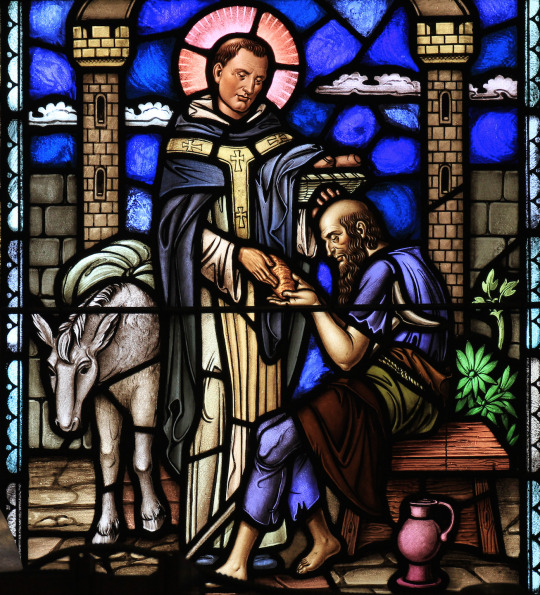
THE DESCRIPTION OF SAINT ANTONINUS OF FLORENCE The Counselor, the People's Prelate and the Dominican Father of the Poor Feast Day: May 2
"In the case, in which, the Pope would become a heretic, he would find himself, by that fact, alone and, without any other sentence, separated from the Church. A head separated from a body cannot, as long as it remains separated, be head of the same body from which it was cut off. A Pope, who would be separated from the Church by heresy, therefore, would, by that very fact itself, cease to be head of the Church. He could not be a heretic and remain Pope because, since he is outside of the Church, he cannot possess the keys of the Church."
Anthony Pierozzi (also called de Forciglioni), was born on March 1, 1389, was soon nicknamed 'Antoninus' ('Little Anthony'), either because of his small stature or his weak health. Thus, began the life of the future saint born to noble parents - Niccolò and Tomasina Pierozzi, in Florence, Italy. Being prominent citizens of the city, Niccolò being a notary. His mother died when he was about five years of age. As a child, he spent time at the church of Orsanmichele.
The influence of the Dominicans on Antoninus' early life led him to seek admittance to the Dominican Order at the age of 15. Antoninus approached the prior of the convent in Fiesole, Brother John Dominic, with his request to be admitted to the Order. Perhaps noticing the weak health of the aspirant and not wishing to give an outright refusal to Antoninus' request, Brother John Dominic told him to come back once he had memorized the Decretum of Gratian, or the Code of Canon Law at the time. To the prior's surprise, the youth returned within the year having accomplished the task required of him. He was thus admitted to the Order.
The love and zeal he had as a novice never left Antoninus. He became a great reformer more by example than by word. Elected prior at a young age, Antoninus served as superior for many years. He, like his brother in St. Dominic, St. Thomas Aquinas, was concerned with the formation of the friars of the Order of Preachers. Hence, he prepared the Summa Moralis, a systematic and comprehensive presentation of Christian Moral Theology, which he wrote, as he said, during the summer and the winter of his life. Antoninus' writings treated the practical aspects of living the faith.
Antoninus' devotion to the Sacrament of Reconciliation and spiritual counsel earned him the title of Antoninus the Counselor. Such was his ability to instruct and to guide others.
Antoninus was also a prolific writer, authoring texts on moral theology, canon law, a guide for confessors, and a chronicle of the history of the world. Antoninus was also widely known and sought-out for his gift of counsel, earning the popular title - 'the Angel of Counsels.'
Antoninus was consecrated Archbishop of Florence on March 13, 1446, at the Dominican priory in Fiesole, on the initiative of Pope Eugene IV, who had come to admire him through his participation in the major church councils of the period. He came to win the esteem and love of his people, especially by his energy and resource in combating the effects of the plague and earthquake in 1448 and 1453. It was they who began the use of the diminutive form of his name which has come to prevail. Antoninus was unusual for his time not only in continually living in his diocese, but also in conducting yearly visits to every parish and convent by foot.
In art, Antoninus is often seen holding a set of scales. This is because of a miracle that tradition attributes to the saint. An inhabitant of Florence once brought the archbishop a beautiful New Year's fruit basket in the secret hopes of receiving a great reward. However, Antoninus simply thanked the donor and sent him away with the words: 'May God reward you.'
Because he received no reward, the man went off discontented. When Antoninus later learned of the man's discontentment, he called for him to come before him again. When the donor did, Antoninus had the fruit basket placed on one side of a set of scales and a slip of paper on the other side bearing the words: 'May God reward you!'
When this was done, the scales registered that the slip of paper far outweighed the fruit basket.
Antoninus accepted into the Order Brother John of Fiesole, the future artist, Fra Angelico. Having an eye for recognizing the gifts of others, Antoninus instructed Fra Angelico to prepare his own Summa Moralis, not in words but through his painting. Hence when the new convent of San Marco was built, Prior Antoninus had Fra Angelico grace each of the friar’s cells with a painting based on a scene from the life of Christ.
After he was appointed Archbishop of Florence, Antoninus' residence became known as the hostel for the poor, such was his generosity and service for victims of poverty. His sensitivity to the needs of others led him to found the 'Men of St. Martin,' in order to offer quiet support to the wealthy who had become indigent. Hence, the Archbishop lived out the works of mercy.
St. Antoninus died on May 2, 1459. His funeral Mass was celebrated by Pope Pius II. The pope happened to be on his way to the Council of Mantua when he heard of the archbishop's death. The archbishop's wish was that he be buried at the priory which he had founded in the city.
He was canonized by Pope Adrian VI on Trinity Sunday - May 31, 1523.
#random stuff#catholic#catholic saints#dominicans#order of preachers#antoninus#antoninus of florence#antonino#antonino de florencia
2 notes
·
View notes
Text

Happy Feast Day
aint Dominic of Silos
1000-1073
Feast Day: December 20
Patronage: prisoners, captives, shepherds, pregnant women, against rabies, rabid dogs, and against insects
Saint Dominic of Silos grew up loving solitude as a shepherd in Spain. He eventually became a Benedictine abbot that reformed both physically and spiritually, the monastery in Silos. It became famous as a center of learning, charity, and healing. Wealthy patrons gave money to the monastery that allowed Christians to be ransomed from the Moors. 100 years after St. Dominic’s death, Blessed Joan of Aza made a pilgrimage to his tomb where he appeared to her and told her that her unborn son would grow up to be St. Dominic Guzman, the founder of the Dominicans.
Prints, plaques & holy cards available for purchase. (website)
21 notes
·
View notes